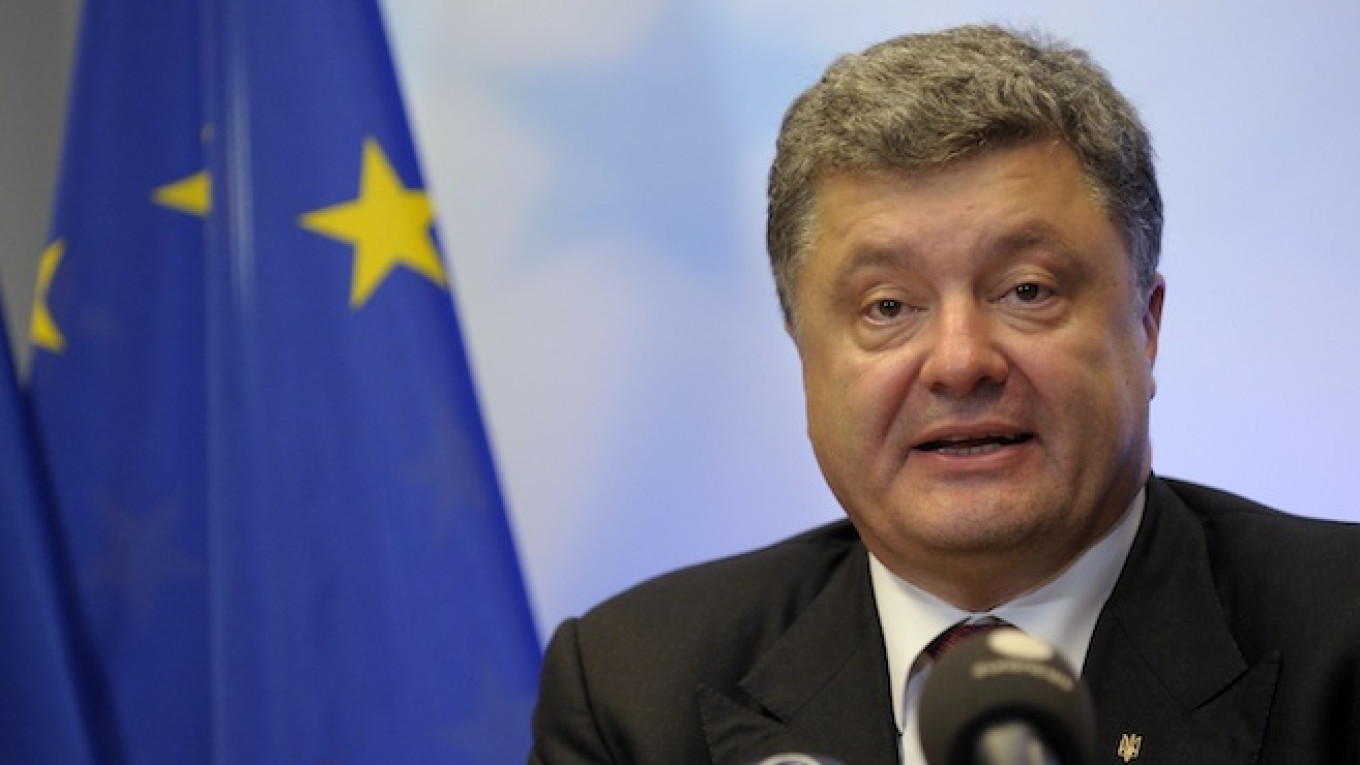As fighting broke out again in Ukraine's rebel-held city of Donetsk, President Petro Poroshenko prepared to unveil a risky plan to give the separatist-minded east "special status" in a bid to end a conflict that has killed more than 3,000 people.
The renewed fighting on Monday in the east's main industrial hub, following a weekend in which at least six people were killed and a team of international monitors was shelled, put fresh strain on a 10-day-old cease-fire between government forces and Russian-backed separatists.
The truce started on Sept. 5 and had been broadly holding up before this weekend, despite sporadic violations.
But on Saturday there was particularly heavy fighting around Donetsk airport, which remains under government control, and shells hit a marketplace in the city, killing at least one woman, according to the OSCE.
By Monday evening, shelling and missile fire could be heard from the airport area, the railway station and Leninsky district near the centre, a correspondent in Donetsk reported.
The rebels' main leader in Donetsk, which had a pre-war population of about one million, accused Ukrainian forces on Monday of violating the truce repeatedly and suggested it could not hold much longer.
"I do not see the sense in [further] consultations. There have to be measures which must first be undertaken and then consultations can take place," Alexander Zakharchenko told reporters in Donetsk.
Temporary Self Rule
The fresh fighting flared as Poroshenko prepared to submit to parliament a draft law that local media said would grant temporary self-rule status to the "people's republics" proclaimed by the separatists.
Poroshenko reluctantly agreed to the cease-fire after battlefield losses and heavy Ukrainian casualties which Kiev said were caused by Russian troops entering the fray on behalf of the rebels.
He hopes the law will counter criticism from Russian President Vladimir Putin that he is failing to address the grievances of the pro-Russian east — something which the Kremlin uses to justify its support for the rebels.
But Poroshenko risks falling foul of Kiev's pro-Western establishment if he is perceived as laying the ground for a new "frozen conflict" on Ukrainian territory, governed by a separatist leadership under Russian protection, similar to those in other ex-Soviet states such as Moldova and Georgia.
The draft, whose contents were leaked on Monday to local media, would grant self-rule to separatist-minded regions for a three-year period and allow them to "strengthen and deepen" relations with neighboring Russian regions.
Commentators say this last point risks impinging on Kiev's declared policy of European integration and may stir opposition within Kiev's political establishment.
The draft would allow the heavily-armed rebels to set up their own police forces and hold their own local elections in November.
It would also offer freedom from prosecution to "participants in the events" in the east — an apparent offer of an amnesty to separatist fighters, until now demonized in Kiev. But Poroshenko on Monday denied this would be an amnesty for those guilty of serious crimes.
Poroshenko, in comments on his website, referred to what he described as a "programmer for giving roots to peace", adding: "Over this period [three years] we will be able to implement deep decentralization which should require amendments to the constitution."
There was no formal reaction from separatist leaders, who have attended peace talks with Ukrainian, Russian and OSCE officials who also negotiated the cease-fire deal.
But the Russian news agency RIA Novosti quoted one leader, Andrei Purgin, as saying: "This is a draft law for Ukraine. Perhaps this will be a point of discussion at future negotiations but no more than that."
A Message from The Moscow Times:
Dear readers,
We are facing unprecedented challenges. Russia's Prosecutor General's Office has designated The Moscow Times as an "undesirable" organization, criminalizing our work and putting our staff at risk of prosecution. This follows our earlier unjust labeling as a "foreign agent."
These actions are direct attempts to silence independent journalism in Russia. The authorities claim our work "discredits the decisions of the Russian leadership." We see things differently: we strive to provide accurate, unbiased reporting on Russia.
We, the journalists of The Moscow Times, refuse to be silenced. But to continue our work, we need your help.
Your support, no matter how small, makes a world of difference. If you can, please support us monthly starting from just $2. It's quick to set up, and every contribution makes a significant impact.
By supporting The Moscow Times, you're defending open, independent journalism in the face of repression. Thank you for standing with us.
Remind me later.


